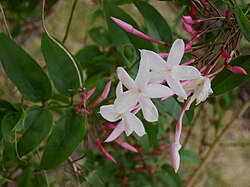Jasminum polyanthum
| Jasminum polyanthum subsp. var. | ||||||||||||||||||||||||||||||||||||||||||||||||||||||||
|---|---|---|---|---|---|---|---|---|---|---|---|---|---|---|---|---|---|---|---|---|---|---|---|---|---|---|---|---|---|---|---|---|---|---|---|---|---|---|---|---|---|---|---|---|---|---|---|---|---|---|---|---|---|---|---|---|

|
|
| ||||||||||||||||||||||||||||||||||||||||||||||||||||||
| ||||||||||||||||||||||||||||||||||||||||||||||||||||||||
Jasminum polyanthum, also known as Pink Jasmine (or White Jasmine), is an evergreen twining climber from China. It produces an abundance of reddish-pink flower buds in late winter and early spring, followed by fragrant five-petalled star-like white flowers which are about 2cm in diameter. It has compound leaves with 5 to 7 leaflets which are dark green on the upper surface and a lighter green on the lower surface. The terminal leaflet is noticeably larger than the other leaflets. The plant is very vigorous and can grow up to 6 metres in height when supported. Depending on the climate, this vine has a semi-deciduous to evergreen foliage.
Jasminum polyanthum is well-known as a house plant in the USA and Europe. It can also grow in the garden, when climate conditions are good. USDA hardiness zones: 8 - 11. It grows fast and easily, and flowers nicely[1]. Outside it can be used to cover walls and fences etc. It can grow in sun and light shade as well.
Jasminum polyanthum was given the Award of Garden Merit (AGM) by the RHS in 1993[2]. It was chosen on the Bicentenary list of 200 plants for the RHS: “This popular houseplant is an easily-grown, evergreen, half-hardy climber with loose panicles in summer of many strongly-fragrant pink-backed, white, trumpet-shaped flowers. It does not suffer pest or disease problems and is simple to propagate.”[3]
Cultivation
Propagation
It is propagated by seed and by suckers.
Pests and diseases
Varieties
Gallery
-
photo 1
-
photo 2
-
photo 3
References
- ↑ See for instance Jasminum polyanthum in Floridata.com
- ↑ Awards of Garden Merit
- ↑ “The Garden” 2004
External links
- w:Jasminum polyanthum. Some of the material on this page may be from Wikipedia, under the Creative Commons license.
- Jasminum polyanthum QR Code (Size 50, 100, 200, 500)
